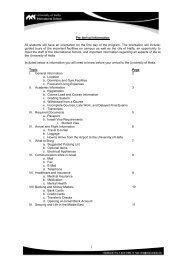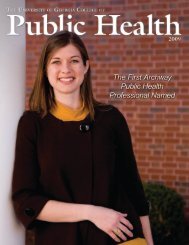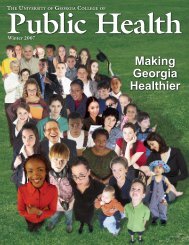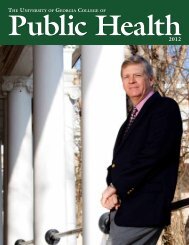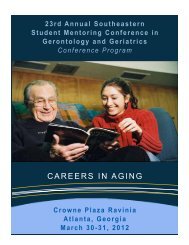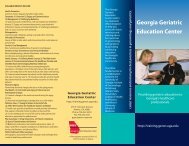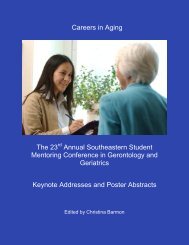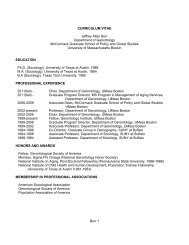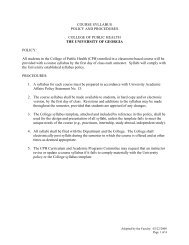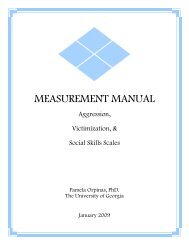Protecting Georgia's Waterways - College of Public Health
Protecting Georgia's Waterways - College of Public Health
Protecting Georgia's Waterways - College of Public Health
Create successful ePaper yourself
Turn your PDF publications into a flip-book with our unique Google optimized e-Paper software.
photo by Nancy Evelyn<br />
Tyson Turner, a recent<br />
graduate <strong>of</strong> the <strong>College</strong><br />
<strong>of</strong> <strong>Public</strong> <strong>Health</strong>, pursued<br />
and earned a pair <strong>of</strong><br />
degrees from UGA and<br />
Duke University at the<br />
same time.<br />
spective, one that is population-based. I’m hoping that year <strong>of</strong> graduate study will<br />
give me that frame in the back <strong>of</strong> my mind.<br />
I’m really interested in doing outcome research, which looks at population<br />
outcomes for different treatments and interventions. Epidemiology fits with<br />
that very well. But I definitely want to practice clinical medicine.<br />
UGA: How did you find returning to UGA for graduate school after experiencing<br />
Duke<br />
Turner: The academic load is definitely difficult, particularly at times such<br />
as finals when multiple courses have assignments due, but the faculty at the<br />
<strong>College</strong> <strong>of</strong> <strong>Public</strong> <strong>Health</strong> was such a help by working with me whenever necessary<br />
to accommodate my (at times) cramped schedule. Also, being in medical<br />
school did wonders for my efficiency in regards to studying, writing papers,<br />
etc., and many <strong>of</strong> the time-management skills that are used there were a major<br />
help to me.<br />
UGA: Your graduate work at UGA concerned the incidence <strong>of</strong> tuberculosis<br />
in Georgia. Should Georgians be concerned about tuberculosis<br />
Turner: Every case <strong>of</strong> tuberculosis diagnosed by a physician has to be reported<br />
to the Division <strong>of</strong> <strong>Public</strong> <strong>Health</strong> at the State level, like anything with<br />
public health implications. The way TB is treated now is, the patient must have<br />
a long course <strong>of</strong> therapy; and they are taking the medication.<br />
In general, TB is still a disease that kills but not like the major killers (e.g.,<br />
cardiovascular disease, stroke, etc.) TB has resurgence once people get older and<br />
have a compromised immune system due to HIV, diabetes, mellitus, cancer, etc.<br />
UGA: What was your research concern<br />
Turner: Pr<strong>of</strong>essor Christopher Whalen and I partnered with the Georgia<br />
Division <strong>of</strong> <strong>Public</strong> <strong>Health</strong>’s tuberculosis branch to analyze the state’s tuberculosis<br />
database (each time a case <strong>of</strong> tuberculosis is diagnosed in Georgia it must<br />
be reported and recorded in this State-managed database). Using this data, we<br />
looked into some <strong>of</strong> the epidemiological factors associated with tuberculosis diagnosis,<br />
including a description <strong>of</strong> the cases based on age, sex, race/ethnicity, etc.<br />
Our main focus, though, was to try to find out why we are seeing an increase<br />
in tuberculosis cases in the foreign-born population in Georgia. We’re<br />
thinking it could be due to either increased immigration levels (i.e. more cases<br />
just because we’re having more immigrants into the state) or due to “ongoing<br />
transmission” in foreign-born communities once they immigrate into the state.<br />
We’ve also tried to look at the molecular “typing” <strong>of</strong> the TB strains (i.e., how<br />
we identify which strain <strong>of</strong> TB each individual contracts) to see how <strong>of</strong>ten TB<br />
strains are unique versus how <strong>of</strong>ten they are shared between many different<br />
cases across the state.)<br />
UGA: When did you realize you wanted to become a physician<br />
Turner: I grew up in Lincolnton, Ga., which is a small town on the Georgia/South<br />
Carolina border approximately 40 miles north <strong>of</strong> Augusta. I’m not<br />
sure when I first decided to apply to medical school; it was always something<br />
that was in the back <strong>of</strong> my mind, and I suppose eventually it just made its way<br />
to the forefront. (Not enthralling, I know.) Looking back on it, I suppose the<br />
pr<strong>of</strong>ession just made sense for me: I’ve always enjoyed science and have been<br />
intrigued by human health and illness, and medicine seems to be the best way<br />
for me to make a positive impact on others. No one in my family is a physician,<br />
but I did have a fair amount <strong>of</strong> exposure to the healthcare field through my father<br />
and sister, both <strong>of</strong> whom are pharmacists, and so I suppose I was attracted<br />
to the field in that way, too.<br />
(This article first appeard in the Summer 2009 issue <strong>of</strong> the Graduate<br />
School Magazine.)<br />
Global <strong>Health</strong> Symposium Connects<br />
UGA with the World<br />
By Johnathan McGinty<br />
Richard Schuster is a passionate<br />
believer in the core mission <strong>of</strong> the<br />
University <strong>of</strong> Georgia’s Center for<br />
Global <strong>Health</strong>, and it is that passion<br />
which drives research and academic<br />
pursuits.<br />
The Center for Global <strong>Health</strong>, a<br />
component <strong>of</strong> the <strong>College</strong> <strong>of</strong> <strong>Public</strong><br />
<strong>Health</strong>, has a clear purpose built upon<br />
identifying the best practices in health<br />
care, disseminating those practices<br />
across the globe and then encouraging<br />
their adoption.<br />
Schuster said the Global <strong>Health</strong><br />
Symposium, sponsored by the Center<br />
for Global <strong>Health</strong>, is a key component<br />
in disseminating that research and<br />
information to health care providers<br />
and also the public at large. This year’s<br />
symposium, held April 8-9 at the<br />
Coverdell Center for Biomedical and<br />
<strong>Health</strong> Sciences, focused on disease<br />
and health in East Africa.<br />
“Interest in global health has<br />
exploded both in the U.S. and around<br />
the world,” Schuster said. “The<br />
reason is that globalization is having<br />
a pr<strong>of</strong>ound impact everywhere in<br />
the world. And to reference Thomas<br />
Friedman’s famous book, the world<br />
really is flat, and it doesn’t matter<br />
where you are anymore, we’re all in<br />
contact with each other.”<br />
Schuster said the assumption that<br />
the best practices in health care are<br />
uni-directional, or that they simply<br />
originate in the U.S. and are spread<br />
out through the rest <strong>of</strong> the world, is<br />
a simplistic approach. For instance,<br />
there are vast cultural and societal<br />
challenges when it comes to adapting<br />
and adopting some <strong>of</strong> those models.<br />
Natalie Arford, a research<br />
coordinator at the Center for Global<br />
<strong>Health</strong>, noted that those cultural<br />
Richard Schuster<br />
differences require that some <strong>of</strong> the<br />
best practices must be modified to<br />
achieve success abroad.<br />
“For example, there are male<br />
doctors in Afghanistan, and they will<br />
bring in women soldiers to come and<br />
assist them on certain projects,” she<br />
said. “The men can’t go and examine<br />
the females, so they use the women<br />
soldiers as an intermediary.”<br />
Understanding those types <strong>of</strong><br />
differences is essential for successful<br />
implementation, and, for the past<br />
three years, the Global <strong>Health</strong><br />
Symposium has <strong>of</strong>fered the ability to<br />
share research and discuss practices.<br />
In line with this year’s emphasis<br />
on East Africa, the <strong>College</strong> <strong>of</strong><br />
<strong>Public</strong> <strong>Health</strong> has established<br />
multiple academic and educational<br />
relationships with institutions in<br />
various East African nations, including<br />
one with Makerere University in<br />
Uganda. Spearheaded by the work<br />
<strong>of</strong> UGA’s Christopher Whalen, he<br />
has established what Schuster deems<br />
a true partnership with the African<br />
institution.<br />
Thanks to a multi-year grant<br />
from the National Institute <strong>of</strong> <strong>Health</strong>,<br />
the partnership enables Makerere<br />
to conduct mutual research with Dr.<br />
Whalen and his team at the <strong>College</strong> <strong>of</strong><br />
<strong>Public</strong> <strong>Health</strong> and regularly exchange<br />
students with UGA.<br />
“In globalization, we <strong>of</strong>ten talk<br />
about the brain drain <strong>of</strong> people who<br />
come to America, highly educated,<br />
from around the world and stay here,”<br />
Schuster said. “This is an example <strong>of</strong><br />
people who are highly educated, who<br />
come here and get even more highly<br />
educated, and then bring those skills<br />
back to their native country.”<br />
Schuster said next year’s<br />
symposium will focus on a new<br />
bilateral relationship between the<br />
<strong>College</strong> <strong>of</strong> <strong>Public</strong> <strong>Health</strong> and the<br />
University <strong>of</strong> Haifa in Israel. Slated<br />
for fall <strong>of</strong> 2011, the event currently is<br />
being planned by faculty at UGA and<br />
Haifa, and it has earned a sponsorship<br />
from the Israeli government.<br />
Next year’s symposium will also<br />
be supported by a private gift from<br />
Dr. Harold S. Solomon (BS ’61) and<br />
his wife, Milly Pincus Solomon, who<br />
also attended UGA.<br />
To be included on the mailing<br />
list to learn more about<br />
next year’s Global <strong>Health</strong><br />
Symposium, please contact<br />
Kate O’Reilly at 706-542-2590<br />
or krl@uga.edu.<br />
20 <strong>College</strong> <strong>of</strong> <strong>Public</strong> <strong>Health</strong> Fall 2010 21




